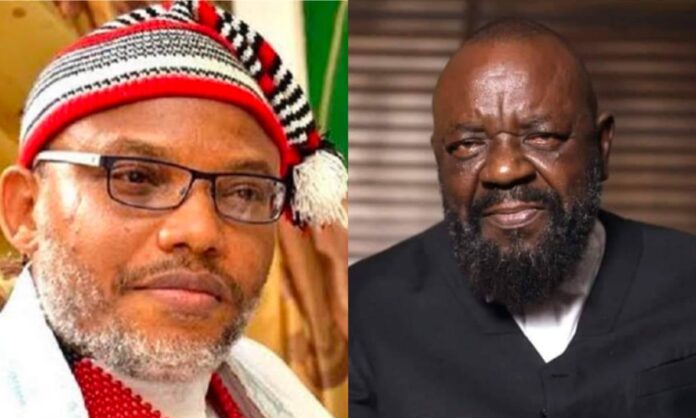The leader of the Indigenous People of Biafra (IPOB), Nnamdi Kanu, has filed an appeal at the Court of Appeal challenging his ongoing trial by the Nigerian government.
Kanu, through his lawyer Aloy Ejimakor, argues that the Federal High Court in Abuja, presided over by Justice Binta Nyako, lacks jurisdiction due to alleged violations of his constitutional right to a fair trial.
The appeal specifically accused the Nigerian government of forcibly seizing and photocopying confidential legal documents brought to Kanu by his lawyers, hindering his defense preparation.
The appeal application reads:
“The Appellant (Nnamdi Kanu) filed this appeal against the Ruling of the Federal High Court, Abuja Division coram: B.F.M Nyako, J. delivered on the 19th March, 2024.
“The said Ruling of the trial court is contained at Pages 42 – 43 of the Record of Appeal; and the Notice of Appeal is at Pages 44-49 of the said Record. The Record of Appeal was transmitted to this Honourable Court on the 16th day of May, 2024. There are three grounds in the Notice of Appeal and the issues argued herein have been distilled from the said three grounds.
“My Lords, Appellant has been in pre-trial detention since June 2021 at the Headquarters of the State Security Services (SSS) in Abuja; and he is currently on trial on a seven-count Charge, some of which are capital offenses punishable by death. On 19th February 2024, the Appellant filed a ‘Notice of Preliminary Objection’ to the jurisdiction of the trial court, pursuant to Section 36(6) (b) and (c) of the Constitution of the Federal Republic of Nigeria, 1999 (as amended) and under the inherent jurisdiction of the trial court. The said Notice of Preliminary Objection was supported by an Affidavit, three Exhibits and a Written Address; and it was brought on the following grounds (See Pages 3 – 24 of the Record of Appeal):
“The Respondent’s act of forcible seizure and photocopying of confidential legal documents brought to the Appellant at the Respondent’s detention facility by his Lawyers, said documents pertaining to facilitating the preparation of Appellant’s defence, amounts to denial of Appellant’s constitutional right to be given adequate facilities for the preparation of his defence and to be defended by legal practitioners of his own choice and is thus a grave violation of Appellant’s constitutional right to Fair Hearing as guaranteed under Section 36(6)(b) & (c)of the Constitution of Federal Republic of Nigeria, 1999 (as amended).
business. The Defendant is entitled to a counsel of his choice and should be given the facility to conduct an interview with his counsel within the confines of the law?’ (Distilled from Ground Two of the Notice of Appeal).
“Was the learned trial Judge not wrong in the peculiar circumstances of the case to order for accelerated hearing of the case in the face of the evidence showing that the Respondent had consistently refused to afford the Appellant the right to adequate facility to prepare for the defence of the charges levelled against the Appellant and his unfettered right to counsel?(Distilled from Ground Three of the Notice of Appeal),” Ejimakor stated.
The appeal seeks the following:
“Set aside the decision/ruling, the subject of this appeal; and in particular: For the trial court to decline jurisdiction to proceed with the hearing of the case unless and until the Appellant is, by the Respondent, granted his right to fair hearing under Section 36(6)(6)(b) and (c) of the Constitution; or in the alternative for the trial court to order an alternative custodial or non-custodial arrangement free of Respondent’s interference with Appellant’s said constitutional right to fair hearing.
“Set aside the order for accelerated hearing of the case in the circumstances of the case where the Appellant is not allowed facilities to prepare for the defence of the charges against him and denied his right to counsel.”





